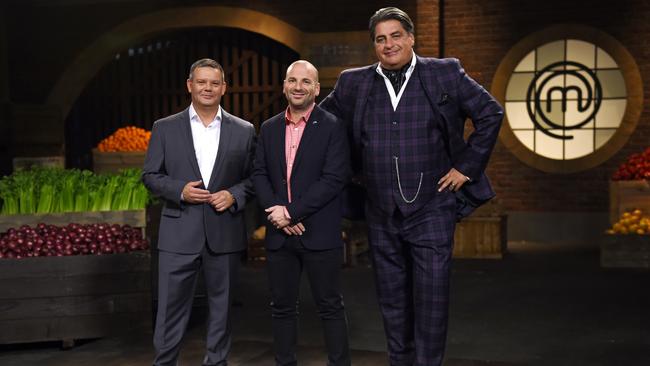MasterChef Australia curries favour in India
The respectful way the MasterChef judges treat contestants has made the show a huge hit in India.

MasterChef star Gary Mehigan says he is often recognised in Australia, but in the same way that people are familiar with their local butcher, rather than in any fawning sort of pop-star way.
He’ll be out shopping and someone will ask for an ingredient and the shopkeeper will say, “Sorry we don’t have it, but maybe Gary can tell you where to get it”. And often he can.
In India his relationship with the public is not so casual. Mehigan along with Matt Preston and George Calombaris are superstars on the level of cricketers and Bollywood actors. They’ve been mobbed and chased down the road by fans on motor scooters.
In the city of Bengaluru, which they visited last week, more than 80 journalists and bloggers cheered and clapped when the men held a press conference.
Accurate figures are hard to come by, but MasterChef is said to be among the highest rating English-language programs in India and that means it is watched by many, many millions of people.
Just about every Indian The Australian quizzed professes to watch and love the program, from cooks and drivers to authors and surgeons.
“Culturally, food is such a big part of being an Indian and we grow up with memories of our Mum’s khana, which is the Hindi word for food,” said food blogger Tanya Dhar. “The moment you enter someone’s house, the first thing they ask you is ‘Can we get you something to eat?’
“MasterChef Australia was such a big hit when it came to India. And it’s because the three judges — Gary, Matt and George — have such amazing, huge personalities.”
She said Indians admired the respectful way they treat the contestants. And so in India — where there have been perceptions about Australia being a racist country, a place where Indians are unwelcome — these master chefs are, in effect, culinary diplomats.
“When MasterChef kicked off here in India, there were some racial issues with people getting beaten up, taxi drivers and all the rest of it,” Mehigan said while signing plates. “I was speaking to a few businessmen and they said their business relationships at that point had died, and Indians didn’t want to talk to them.”
And then, he was told, when MasterChef started, it all turned around. “I said ‘Seriously!’ The show showed another side to our culture, it showed it was diverse, humorous and respectful, particularly the way we dealt with our contestants.”
It’s what embassy people call “soft diplomacy”, and in this case it was through soft-shelled crabs with paratha, cooked by George; a roast pumpkin, pomegranate, pistachio dish with chicken and local vinegar, courtesy of Matt; and a white chocolate mousse, served up by Gary.
It is something the Australian cricketers could learn from — The Australian witnessed a press conference during the recent T20 World Cup where a cricketer appeared too bored to answer questions from Indian journalists.
“I’ve always maintained it’s much more powerful to move someone by being nice to them, rather than being rude to them,” said Preston. “We had three of the chief editors of the big English-language newspapers from India who came out to Australia and they went to Canberra when there were problems with taxi driver and talk about Australia being racist,” he said.
“Then they came to Melbourne and on to the set of MasterChef and they were like a bunch of kids wanting pictures with us all. They said, ‘In terms of the image that Indians have of Australia, cricket and MasterChef are the two things that export a very positive image’.”



